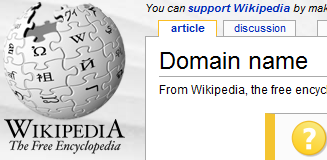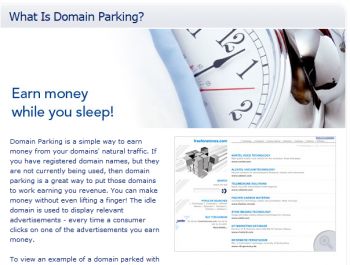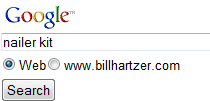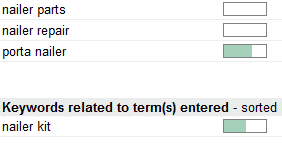
How many domain names do you own? One? Five? Over one hundred? You would probably be surprised about how many domain names I own and how many I have developed. Some are currently parked using a domain parking service. Yet some of the domain names I own redirect to currently developed web sites. And I acquired them just for that purpose: to redirect to an existing web site. Enough about me, though. Let’s think about your existing domain names, what you’re doing with all of them right now, and domain names that you could acquire in the future.
Domain names you’re not using
If you own more than one domain name, then what are you doing with the other ones? Did you register them and they’re just sitting there…making someone else money? Seriously. Like many people, they have bought domain names and they never did anything with them. Nothing. Nada. Zilch. If you typed them in the browser right now they would come up with a “Godaddy web page” or other landing page by the domain registrar…advertising that Registrar’s service and (you might now know this) it is making that registrar money when people click on the PPC ads on that domain name.
Did you know that if you simply went to a domain parking service like Sedo.com to park your domain names. All you have to do is sign up, change the name servers on your domains, and tell the parking company what your domain name is about: give them a keyword phrase. That’s it. If you’re just sitting on some domain names that you’re not using, then you should consider parking them, selling them, or developing them.
Redirecting Domain Names
There is a unique group of people out there that use the 301 Permanent Redirect to their advantage: they acquire domain names that have links and traffic: and they redirect them to their current web sites. That is an option that you have if you own a domain name that has links and traffic. But I would only redirect it to a “live” web site if you are certain that the former topic of that domain name is in line with the domain name you are redirecting it to. So, if you own a former automotive site that has 100 backlinks that are good automotive links then it might make sense to redirect it to your existing automotive web site. There are other factors, and I plan on discussing those factors–and buying domain names for links–at a future date.
How do you know when do develop a domain?
Developing a domain name, whether you install WordPress on the domain name and make it a blog or a site or you hire a development team, a web designer, and a writer should depend on several factors. Developing a domain name, whether you do it yourself or not, means time and money. Let’s take a a look at an example of how you could determine, from an Search Engine Optimization perspective, whether or not you should develop the domain name you own or not.
Ultimately, “Should I develop this domain name or not?” is a question only you can answer. But, I would like to give you my unique perspective on this and how I go about logically determining (from my SEO perspective) whether or not to develop a domain or not.
There a few things that you can do that will might help you decide if you want to develop the domain or not. Here’s what I do. I will use “nailerkit.com” as an example, as it is a lot easier to use a real domain as an example. I currently own that domain name and plan on developing it at some later date.
I would also like to point out that this technique is good for “generic” domain names, ones that contain keywords or keyword phrases (keyword-rich), and do not contain a trademark.
- First, go to Google and search for the domain name’s primary keyword phrase. In this case, I am using “nailer kit“. Are there Google AdWords ads for that phrase? In this case, there are. Companies believe that it’s a good enough keyword phrase for them to actually pay for ads for that keyword phrase.
- Go to the Google Keyword Planner tool and search for the the phrase or keyword. I searched for “nailer kit” without quotes and I see that Google says that there are about 40,500 searches for that phrase, and 25 related phrases. That means that there IS traffic for the phrase, there are people who search for it, and there’s 25 potential pages for the site (one page per related keyword). So, I could fairly easily create a 26 page site.
- Back to the search results for “nailer kit“. I look at the search results’ top 10 to see if someone else is using a domain with keywords in the URL and they’re ranking in the top 10. In this case there is not.
I look at the top 5 search results to see if any of those sites that are ranking are actually targeting that phrase as their main keyword (and they’re not for ‘nailer kit’).
I look at the top 5 search results and check the backlinks to those pages that are ranking. I take the actual page that’s ranking and check it’s links in Yahoo!. In this case, there are 34 links to that page. But, what is important to note is that there are 34 links from the same domain name, Lowes.com, and not from other domain names. If a web site has on-topic links from several different domain names there is a better chance that it will “beat out” a page that only has internal links from one domain name pointing to it. There are a lot of other factors involved in a search engine ranking, but since I should be able to get lots of on-topic links to a whole entire site about “nailer kits” then I stand a good chance of ranking well for “nailer kit” and “nailer kits”.
Some other considerations will include questions like:
- How easily can I create the content? How much will it cost to hire someone to write 26 pages of material about nailer kits? I could write it myself (probably about 1 day of time to write the content) or I could get someone else to write it (I have a writer who will write unique content for me at $7 an article or page).
I could also see a very good “link bait” type of articles on the site, one about “how to use a nailer” and “how to use framing nailers” and “how to pick the right nailer”. This is the type of content that other sites like to link to. And they tend to do well in the social media, which will help.
- Can I easily monetize the site? In this case, I can use a combination of Google AdSense and Yahoo! Publisher Network ads as well as affiliate product ads (using affiliate programs, potentially through popshops.com). I can find a lot of “nailer kits” and nailers to sell on the site.
- Would someone want to purchase the domain at a later date if it has traffic, is developed, has a revenue stream, and is a good generic domain? Yes, I think so.
- What is the link strategy? How are you going to get on-topic links to the site? In this case, once the site has enough content (I have already found 26 different pages for the site), submitting it to dmoz.org, botw.org, business.com, yahoo directory, and various home improvement sites will help. Spending about $500 on links and on directory listings will help. Using the content and the link bait articles on the site to promote the site in the social media will potentially help get links to it.
At this point, I have decided that it IS worth it to take the time to develop nailerkit.com. There’s enough potential traffic for the topic and I could develop it. Actually developing it will increase that domain name’s value in the long run and it will appeal the the “sellability” of the domain in the future. By searching for the site’s main keyword phrase, by doing some basic keyword research, and by looking at the overall potential for the domain name’s advertisers or your “potential profitability”, you should be able to determine whether or not you should develop the domain name or not.
Do you have questions? Do you have a domain name that you’re thinking of developing and want me to take a look at its overall marketability? Let me know.
Domain Name Background Check Service
Don’t buy a domain name without thoroughly checking out the domain name. Whether it’s a domain you’re purchasing on the aftermarket, an expired domain, a dropped domain, or just registering it for the first time, do your due diligence. What can happen? It could be banned in the search engines, emails could go undelivered because of former email spam issues, or it could have a trademark issue. You could lose your domain name! Hartzer Consulting’s domain name background check and due diligence service gives you peace of mind when buying your next domain name.


